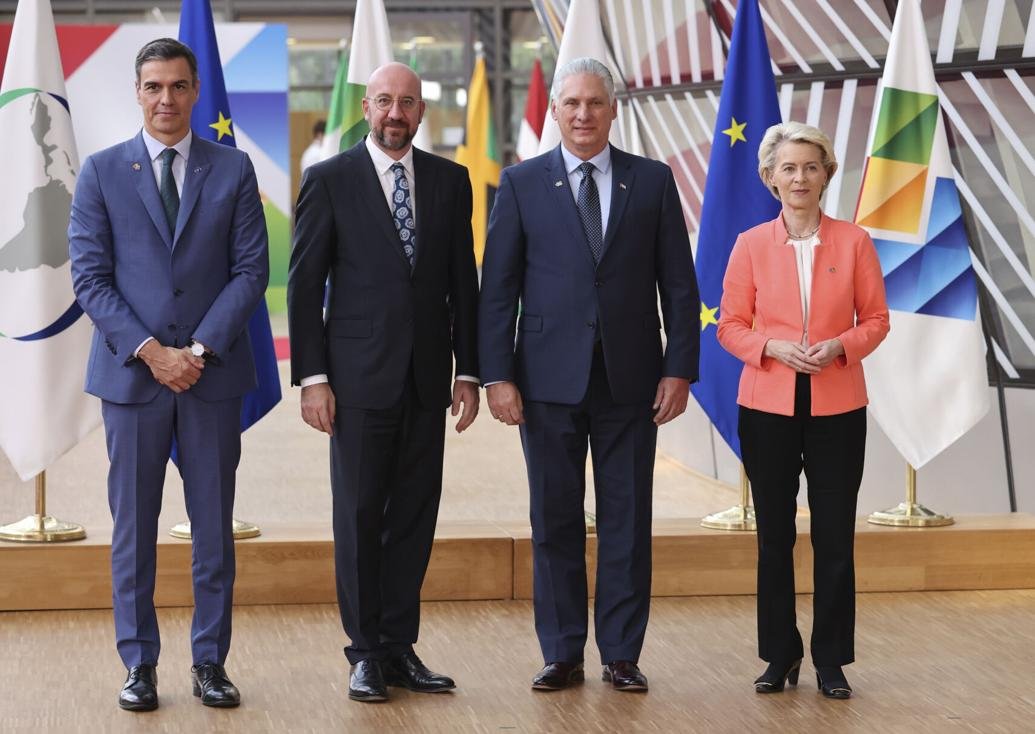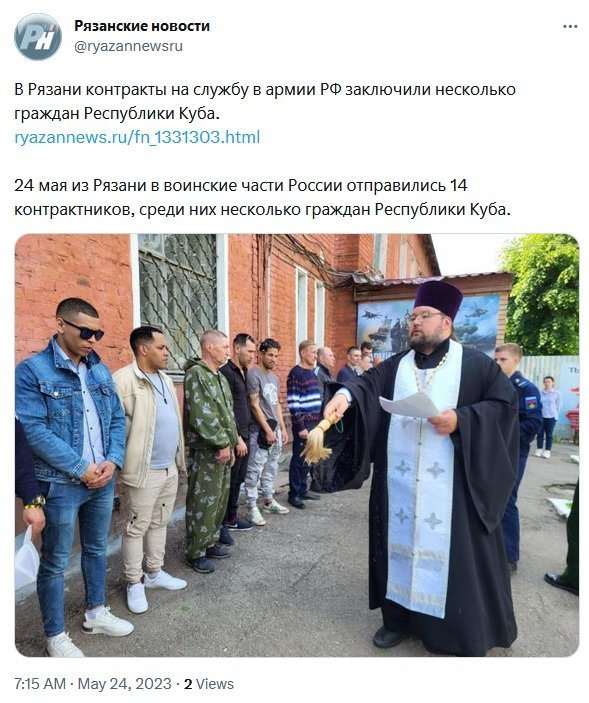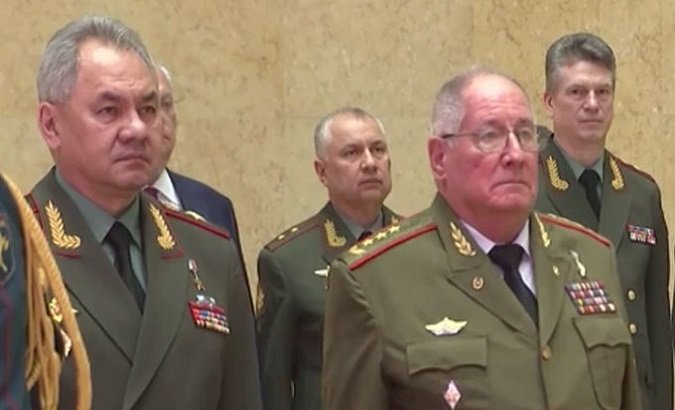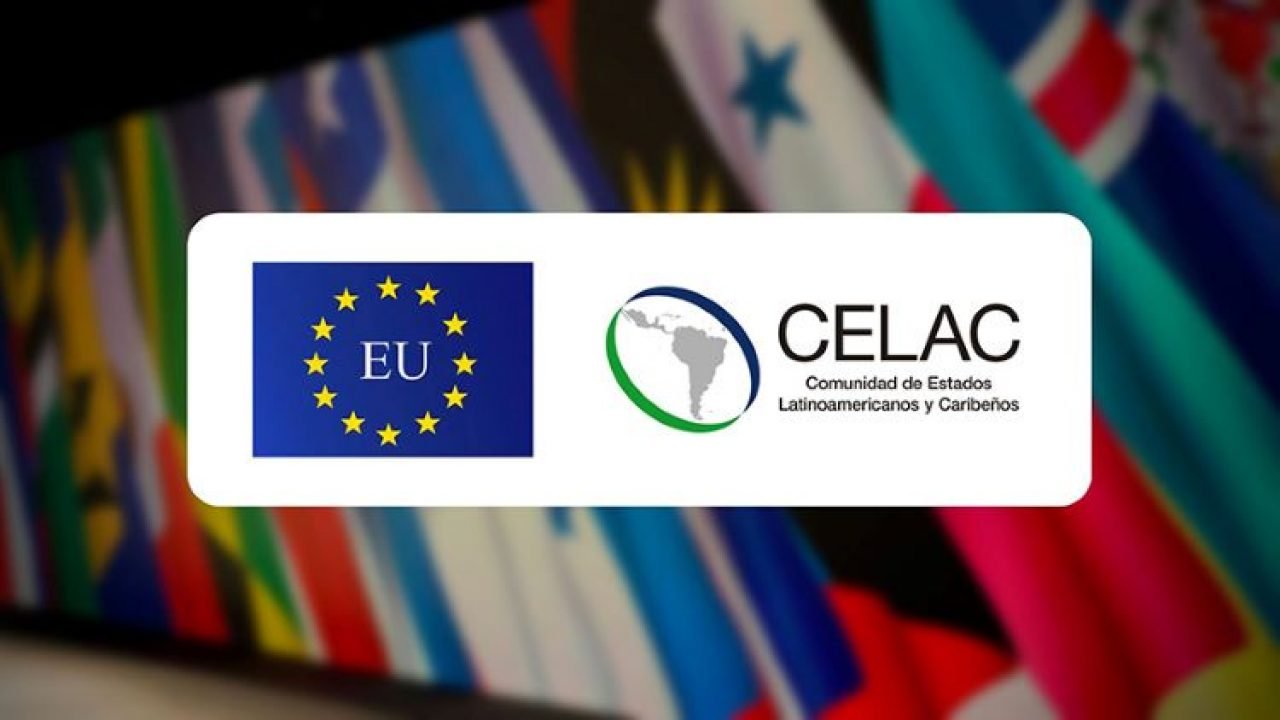One of these is not like the others. Spain’s Prime Minister Pedro Sanchez, European Council President Charles Michel, Cuba's hand picked president Miguel Diaz-Canel and European Commission President Ursula von der Leyen
Miguel Diaz-Canel, who should be in the dock at the International Criminal Court for giving the order of combat against unarmed and nonviolent Cuban citizens on July 11, 2021, was received in Brussels by European leaders at the EU-CELAC Summit.
This is a bilateral summit between a Latin American regional group and the European Union. Ukraine is not a member of either body, and thus needed an invitation. Havana led the successful effort to veto Ukrainian President Volodymyr Zelensky's request to participate in the EU-CELAC Summit. The communist dictatorship in Cuba was aided by both Caracas and Managua in this Pro-Putin effort. This is a far cry from what the Europeans wanted in the midst of a major land war in the heart of Europe, but it should not be a surprise.
The Community of Latin American and Caribbean States (CELAC) was proposed by Hugo Chavez on February 23, 2010, and formed on December 3, 2011, in Caracas, Venezuela, with the signature of The Declaration of Caracas. This regional bloc consists of 33 countries in Latin America and the Caribbean having five official languages. The purpose of this body is to create an alternative to the Organization of American States, that also excludes Canada, and the United States.
Embracing this regional body, founded by an autocrat, is not good for international human rights, much less democracy.
However, it is not just this regional engagement that is problematic, but also EU bilateral relations with Cuba.
The High Representative of the Union for Foreign Affairs and Security Policy Josep Borrell, the European Union's equivalent of a Secretary of State, traveled to Cuba from 25-27 May 2023 to represent the EU at the third Joint Council, co-chaired on the Cuban dictatorship's side by Cuban Foreign Minister, Bruno Rodríguez. Borrell emphasized economic ties, while downplaying human rights concerns, but repeatedly called on the Cuban government to take a more responsible position on Ukraine.
During his May 25-27 visit Borrell highlighted that one third of Cuba's foreign trade was with the European Union, versus only 8% with Russia, and he claimed the relationship was based in "mutual respect." Someone should tell Havana.
Josep Borrell, and Miguel Diaz-Canel in Havana in May 2023.
Despite this strong trade relationship, since the start of this second phase of the Russian invasion of Ukraine on February 24, 2022 the Cuban government, together with their ideological allies in the region, including Managua and Caracas, have sided with Moscow.
Havana is translating Russian propaganda to Spanish, engaging in diplomatic efforts to back Putin's illegal war. In early June 2023 evidence appeared that Havana is escalating its involvement sending "volunteers" to fight both in the Russian army, and the Wagner group.
Havana has signed an agreement with Minsk to send Cuban soldiers to Belarus for "military training". Minsk has sided with Moscow in the Ukraine war.
On June 28, 2023, Cuba and Russian defense ministers met in Moscow to discuss joint 'technical military' projects.
Russian Defense Minister Sergei Shoigu hosted Cuba’s Minister of the Revolutionary Armed Forces, Gen. Alvaro Lopez Miera meet in Moscow.
It is worth reviewing what Havana has been up to prior to the visible presence of troops fighting in Ukraine.
The UN General Assembly on September 16, 2022 voted to allow Ukraine President Volodymyr Zelensky to deliver a pre-recorded address next week at the UN General Assembly, reported the Associated Press. Normally, all leaders need to speak in person, but an exception is being made because of the ongoing Russian invasion. 101 countries voted for Zelensky to be able to deliver the pre-recorded statement. 19 nations abstained, and seven voted no. Cuba was one of the seven countries voting "no" together with Belarus, Eritrea, Nicaragua, North Korea, Syria, and Russia.
On October 12, 2022 at the UN General Assembly Cuba was one of the 35 countries that abstained, and its ally Nicaragua was one of the 5 that voted against a resolution condemning the Russian Federation’s annexation of four Eastern Ukraine regions.
On September 16, 2022 Cuba was one of seven countries voting "no" at the UN General Assembly together with Belarus, Eritrea, Nicaragua, North Korea, Syria, and Russia. This "no" vote was to silence Ukraine President Volodymyr Zelensky from delivering a pre-recorded address at the UN General Assembly.
On September 15, 2022 "Russian top propagandist Vladimir Solovyov urged for the establishment of an international coalition with countries" that included Cuba, Iran, Nicaragua, North Korea, Syria, Serbia, and Venezuela for its war against Ukraine.
On April 7, 2022 Cuba, Russia, China, North Korea, Iran, Syria, and Vietnam, were among those who voted against suspending Russia from the UN Human Rights Council ( 93 voted to suspend, 24 against, and 58 abstentions.)
On March 2, 2022 Cuba and Nicaragua abstained from the vote condemning the Russian invasion at the United Nations General Assembly. ( 141 votes to condemn the invasion, 5 against and 35 abstentions).
Euronews reported on February 24, 2022 that "only Cuba, Venezuela, Nicaragua and Syria supported the Russian recognition of independence for the occupied regions in Luhansk and Donetsk."
The Cuban government is spreading Russian propaganda both domestically and internationally defending Putin's invasion, and repeating Moscow's talking points.
Cubans dissenting from this official line on the island have been arrested.
Cuba has taken part in Russia’s International Military Exercises that in 2022 were held in Venezuela and Iran.
What is taking place on the international scene today is the maxim and corollary expressed by the late playwright, dissident, and former Czech president Václav Havel, in a August 1969 letter to the overthrown Czechoslovak Communist Party chairman Alexander Dubček: "Even a purely moral act that has no hope of any immediate and visible political effect can gradually and indirectly, over time, gain in political significance."
The corollary was expressed by him in The New York Times on October 13, 2009 in an article titled "Vaclav Havel, Still a Man of Morals and Mischief": in an interview that was supposed to be about the revolutions that overturned communism 20 years earlier, President Havel asked if it was true that President Obama had refused to meet with the Dalai Lama? Havel responded:
“It is only a minor compromise,” Mr. Havel said of the nonreception of the Tibetan leader. “But exactly with these minor compromises start the big and dangerous ones, the real problems. “This is actually the first time I really do mind something Obama did,” Mr. Havel said. He minded it “much more” than Mr. Obama’s recent decision not to station elements of a missile-defense system in the Czech Republic, a move that several Central European politicians criticized but that Mr. Havel noted was ultimately “an internal American decision.”
Europe’s policy toward Cuba ignores the reality that Cuba is a communist regime that sponsors terrorism, and is allied with Beijing, and Moscow in their shared objective of destroying the existing international order, and replacing it with one overseen by autocrats.
On September 21, 2022, Ukrainian President Volodymyr Zelenskyy called out Cuba, Belarus, North Korea, Eritrea, Nicaragua, Russia, and Syria for their failed attempt to prevent him from addressing the UN General Assembly in a video speech. Based on the warm response Mr. Diaz-Canel received at the EU-CELAC meeting, the Ukrainian President's observation had little impact on European leaders.
SPUTNIK International, July 17, 2023
European Council President Did Not Invite Zelensky to EU-CELAC Summit - Reports
5 hours ago
MOSCOW (Sputnik) - The President of the European Council, Charles Michel, declined Ukrainian President Volodymyr Zelensky's request for participation in the Summit of the European Union and the Community of Latin American and Caribbean States (CELAC), which starts on Monday, a Spanish newspaper reported.
The summit will be "an opportunity to listen to our partners from the CELAC countries about how to put an end to the aggression," the sources claim.
On July 6, a European news agency reported that Spain, which presides over the Council of the European Union, had sent an invitation to Zelensky to participate but it was canceled after Latin American countries expressed unwillingness to be dragged into the conflict, which they see as a primarily "European problem."
The third EU-CELAC Summit takes place from July 17-18 in Brussels. Among the topics for discussion will be global peace and stability, trade, investments, economic recovery, security, research and innovations and struggle against climate change.
The officials of EU and CELAC are expected to attend the summit. It is to be co-chaired by the President of the European Council and Prime Minister of Saint Vincent and the Grenadines, Ralph Gonsalves, who temporarily heads the CELAC. President of the European Commission Ursula von der Leyen and the EU High Representative for Foreign Affairs and Security Policy Josep Borrell are to participate in the summit.
euro.ESEuro, July 14, 2023
The regimes of Cuba, Venezuela and Nicaragua veto the presence of Zelensky at the EU-CELAC Summit
Strong pressure from the regimes in Cuba, Venezuela and Nicaragua resulted in the Council of the European Union confirming that Ukrainian President Volodimir Zelensky will not attend to the European Union (EU) – Community of Latin American and Caribbean States (CELAC) Summit, which will be held between Monday and Tuesday in Brussels.
A senior EU official made the decision public during a briefing organized by the Council of the European Union, the Argentine media reported. infobae.
One of the spokesmen for the European bloc later said that Zelensky was not invited, given that he already visited the Belgian capital in February and has just participated as a special guest at the NATO summit in Vilnius, Lithuania. Likewise, the official, whose name is not mentioned in the report, recalled that Ukraine is not part of the EU or CELAC.
“This is the first summit with CELAC that we have had in eight years, and the regions are aligned. It is clear the collateral damage in other parts of the world from the Russian aggression, which has caused damage and fragilities, which has created food insecurity and increased inflation. All of this will probably be discussed (at the Summit), but President Zelensky is not going to attend,” the official agent quoted as saying.
This same week the Ukrainian president himself had explained that the Spanish president, Pedro Sánchez, invited him to be part of the Summit, but that several Latin American countries had “blocked” their assistance. The president did not say which countries were.
In the region, the regimes of Cuba, Venezuela and Nicaragua support the invasion of Moscow against the neighboring country, while Brazil has tried to maintain a neutral positiondespite the fact that Brazilian President Lula da Silva ignored his Ukrainian counterpart during the recent G7 summit in May.
For its part, Argentina distanced itself from the decision, indicating that it should be the attending countries that approved or not the presence of Zelensky. For his part, the Uruguayan president, Luis Lacalle, supported the presence of the Ukrainian at the meeting.
--
According to the Spanish press, Sánchez thought that the imminent Summit could be a good opportunity for the region to understand the Ukrainian version of the conflict. However, the Spanish American States did not agree.
Havana is one of the few governments that did not come out in favor of the main resolutions condemning the Kremlin at the UN General Assembly in 2022 for his invasion of Ukraine: he abstained from voting in March 2022 (demanding the withdrawal of Russian troops from Ukraine); in October 2022 (against the annexation of the occupied Ukrainian regions) and in February 2023 (in support of a “comprehensive, just and lasting” peace in Ukraine).
It further opposed the November 2023 resolution, which stated that Russia should pay reparations to Ukraine for damage caused during the military operation.
In April 2023, it abstained when the United Nations Human Rights Council voted overwhelmingly to extend the mandate of a panel investigating possible war crimes committed since Russia’s invasion of Ukraine.
In May, it voted against a World Health Organization (WHO) resolution in support of the Ukrainian health system. and condemning the attacks against health facilities in that country by Russia.
Havana also voted against the Ukrainian president addressing the UN General Assembly by video in September 2022. Despite this, this intervention occurred.
https://euro.eseuro.com/world/639229.html
TASS, July 6, 2023
EU nixes Zelensky’s invitation to summit after Latin America objects — portal
The heads of Central and Latin American countries, who are to travel to Brussels on July 17-18, insisted on removing all paragraphs on support for Ukraine from the draft final declaration of the event
BRUSSELS, July 6. /TASS/. The leaders of 33 Latin American and Caribbean nations have persuaded the European Union to cancel Ukrainian President Vladimir Zelensky’s invitation to the upcoming EU-CELAC Summit of Heads of State and Government, the Brussels-based EURACTIV news portal reported on Thursday citing unnamed diplomatic sources.
Besides, the heads of Central and Latin American countries, who are to travel to Brussels on July 17-18, insisted on removing all paragraphs on support for Ukraine from the draft final declaration of the event.
On the eve of the summit, CELAC leaders submitted their counter-proposal to the draft text which they obtained from Brussels on July 4, the portal said. According to one of its sources, they "deleted everything about Ukraine."
Spain, which presides over the Council of the European Union, has already sent an invitation to Zelensky to participate, but it "was canceled after pushback from Latin American leaders," EURACTIV said.
According to four diplomatic sources interviewed by the portal, the final draft of the document will be discussed by EU ambassadors "in an effort to salvage a draft communique." Per the report, there is a chance that no final document will be adopted at the summit.
Earlier, EU High Representative for Foreign Affairs and Security Policy Josep Borrell and European Commission President Ursula von der Leyen pledged to work with every single country in the world to demand that they clearly articulate their stance regarding Russia’s special military operation in Ukraine as well as the rise of China. Moreover, during their latest meeting on June 29-30, EU leaders tasked the External Action Service with engaging in "sanctions diplomacy" to make all countries support the union’s anti-Russian sanctions.
https://tass.com/world/1643649
Reuters, June 28, 2023
World
Cuba and Russian defense ministers discuss joint 'technical military' projects
Reuters
June 28, 2023
HAVANA, June 28 (Reuters) - The defense ministers of Cuba and Russia discussed the development of joint "technical military" projects this week at a meeting in Moscow, according to media reports and Russia's defense ministry, just days after mercenaries marched towards the Russian capital.
The longtime political allies - both subject to U.S. sanctions - have sharply increased economic ties in recent months, facilitating trade and investment to circumvent those restrictions.
Russian defense minister Sergei Shoigu proposed this week to extend that cooperation to the country's militaries, according to a report in Prensa Latina.
"The composition of your large delegation testifies to Cuba's readiness to discuss a wide range of issues in the military and military-technical sphere," Shoigu said in the report. "I propose to discuss in detail all the existing and promising cooperation projects in the military field."
Shoigu's dismissal had been one of the main demands of mutineers led by Russian mercenary leader Yevgeny Prigozhin over the weekend.
Cuba's defense minister Alvaro Lopez said Havana rejected sanctions imposed on Russia by the U.S., and repeated Cuba's position that U.S. wishes to expand NATO had forced Russia's hand in Ukraine, according to a Russian military statement.
"History will demand responsibility from the United States for the consequences of its aggressive military doctrine beyond the borders of NATO, which threatens peace, security and international stability," Lopez was quoted as saying in the Russian military statement.
The meeting came just days after the U.S. said it would have "deep concerns" about Chinese intelligence and military activities in Cuba after the Wall Street Journal reported that Beijing was planning a spy base and new military training facilities on the island.
Cuba has denied those allegations, citing a lack of evidence, and maintains that the only military incursion on the communist-run island is an "illegal" military base operated by the United States at Guantanamo.
Reporting by Dave Sherwood in Havana; Additional reporting by Guy Faulconbridge in Moscow; Editing by Daniel Wallis
CBC News, June 3, 2023
Cornered in Ukraine and isolated by the West, the Kremlin returns to Cuba
Some Cubans fear their island could become a new front for Russia-NATO confrontations
Evan Dyer · CBC News · Posted: Jun 03, 2023
Dozens of Russian officials have travelled to Cuba in recent months — and some former Cuban government insiders are warning that Russia might plan to again use the island as a forward base on the United States' doorstep.
This week, Cuban President Miguel Diaz-Canel went on the Spanish-language version of Russia Today to insist on Cuba's "unconditional" support for Russia.
"We condemn and we don't accept the expansion of NATO to the borders of Russia," he said.
Last week, for the first time ever, Cubans appeared alongside Russians fighting in Ukraine, both in the Russian Army and in the Wagner Group.
Russia says they joined as volunteers and are not part of the Cuban army.
But it was Cuba's regular armed forces that signed a deal this month to train troops in Belarus, a close ally of Moscow heavily involved in the Ukraine war.
Vladimir Rouvinski, a Russian expert on his country's relations with Latin America at the Instituto Colombiano de Estudios Superiores de Incolda in Cali, Colombia, said the Kremlin sees Cuba as America's "near abroad."
"Russians are interested in expanding the relation with Cuba from the logic of reciprocity, in order to say to the United States, 'We're here again, and we may make some troubles for you, so pay attention to us,'" he said.
Cuba's crisis of everything
The Russians are coming as Cuba faces its worst economic crisis since Soviet subsidies ended in 1991.
Cuban agricultural production has collapsed and it must now import 80 per cent of its food. But the pandemic cut the flow of tourists bringing the hard currency Cuba needs to buy food overseas. President Donald Trump's tightening of restrictions on U.S. remittances to Cuba further reduced the Cuban government's reserves.
Over the past few weeks, Russian oligarchs have signed agreements with Havana covering a wide range of commercial interests: supplying wheat to Cuba; investments in its sugar and rum industries; revitalizing ports, urban infrastructure and hotels. Russia has agreed to help restart Cuba's steel industry and, more importantly, supply the country with oil.
"The Cuban government does not have a strong position," former Cuban diplomat-turned-dissident Miriam Leiva said from Havana. "It depends on the Russian government giving it oil, food and money. They are even allowing Cuban land to be leased for the first time, for Russian investors.
"There's a very big commitment from the president personally to support the Russian invasion of Ukraine and the war. This distances us from the international community and leaves us isolated."
Leiva, a former Communist Party member who worked in the Soviet Union and East Bloc countries during her time in Cuba's Ministry of Foreign Relations, said the new Russia can't afford to subsidize Cuba as the old Soviet Union did — but the new Cuba is so weak it has to take whatever it can get.
"Cuba's sovereignty is being compromised with all the prerogatives that are being offered to the Russians," she said.
Those prerogatives include Havana allowing Russia to change Cuba's laws to protect its investments.
"The right the Cuban people don't have, the right to determine our laws and our constitution, is being given away to others," she said. "What we Cubans cannot do, the others are going to do. That's the difficult and sad situation."
The Cuban government did not respond to questions posed by CBC News.
Ukraine the catalyst
The collapse of the Soviet Union in 1991 gave Ukraine independence and launched an economic crisis in Cuba that moderated but never really ended.
The dormant relationship between Havana and Moscow began to revive in 2014, when Russia turned to Cuba for diplomatic support for its annexation of Crimea.
Havana obliged and in turn received forgiveness of 90 per cent of its debts with Russia — over $40 billion, a sum Cuba was in no position to repay anyway.
That same year, Russia said it would reopen its old spying station at Lourdes, Cuba, a facility Russian President Vladimir Putin closed as a cost-saving measure in 2002.
But not much actually changed until early last year, when Russia was secretly preparing to invade Ukraine. It was Russian Deputy Defence Minister Sergei Ryabkov who brought up the idea of sending Russian troops to Cuba or Venezuela — a clear attempt to convince the West not to interfere in Moscow's plans for Ukraine.
One month later, Russian tanks rolled into Ukraine, a move Cuba immediately blamed on NATO. The next day, the Cuban government effectively warned Cubans not to question that position when it arrested a dissident who tried to lay a bouquet of flowers on the steps of the Ukrainian embassy.
As the war began to turn sour for Russian forces, Cuba's situation was also worsening, said Cuban ex-diplomat Juan Antonio Blanco.
The former member of the Communist Party's Central Committee for foreign relations said he became disillusioned when the party rejected reforms following the collapse of the Soviet Union. He ended up in exile in the U.S.
He said Cuba's multiple crises reached a desperate state by October with the accelerating collapse of Cuba's energy grid.
https://www.cbc.ca/news/politics/russia-cuba-ukraine-putin-missiles-1.6863359





